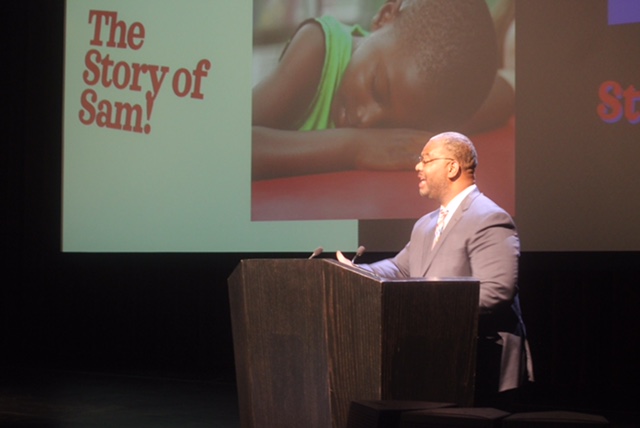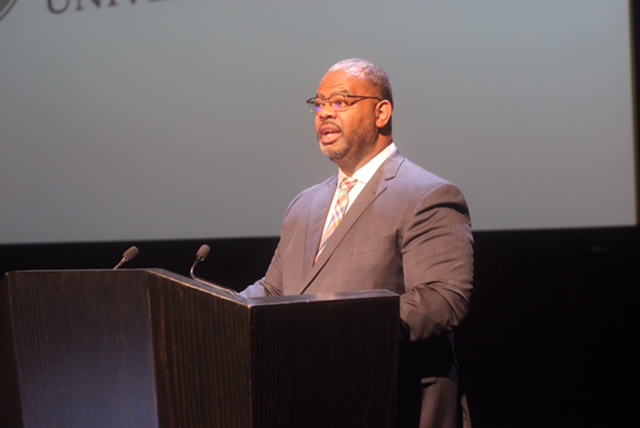By DAVID DUPONT
BG Independent News
Before “Doctor Tony” Anderson was an educator and music producer, he wanted to play basketball. And when that didn’t work out, he persisted and moved on to become an educational innovator. That work led him to collaborating with The Roots as an artistic manager.
He’s now assistant principal at his Columbus alma mater and has founded the Paragon Project to develop the talents of students.
That round trip back to Fort Hayes Metropolitan Education Center was hardly a straight line, Anderson told those participating in the recent Day of Dialogue at Bowling Green State University.
Anderson wanted to play basketball at Xavier University in Cincinnati, he said.
That dream ended tears.
The Columbus native went to Xavier with hopes of making the Division I team as a walk on. But on arrival he realized that while he may be as good as some of the players, the demands of Division I athletics were more than he wanted to take on. Still the coach let him stay and practice with the team as a manager. That lasted two games. He found washing his teammates underwear demeaning. He cried knowing his basketball dreams were over.
Then he saw that the school was looking for someone to don the mascot gear. This was something he could do. Do well. And enjoy.
He was in the game, stirring up the crowd, pointing to where the opposing player had stepped out of bounds.
Basketball wasn’t his only talent. He was a performer. He was able to attend Xavier as a vocal arts major because of a music scholarship.
In the third grade, his teacher heard him singing along to the National Anthem, and told him he had talent. He joined the Columbus Boychoir, conducted by its founder Eugene B. Jefferson, which toured and competed with the likes of the Boys Choir of Harlem and the Vienna Boys’ Choir.
He found a different kind of musical inspiration in the Self Esteem Team that would rap about being drug free and other social issues. This was music closer Anderson’s heart. When the founder, Alfred Ray, asked him to be a coordinator, he discovered a new passion – teaching.
Though he didn’t know it at the time, the pieces of what would become a successful career were coming together.
He attended Fort Hayes Metropolitan Education Center, a magnet school for high achieving students. His mother had to put his name into a lottery to earn him a spot.
Now he’s returned as an assistant principal at the school, and following the footsteps of his mentors has founded The Paragon Project, a collective of artists, musicians, and writers who attend the school.

Coming back was no easy road. When he graduated from Xavier, he decided to pursue a graduate degree in education. The music he’d studied in college was not the hip hop and neo-soul he loved. He was deeply involved in the local music scene as well as being politically active. Those “shenanigans” were evident in his grades. He struggled to get into a graduate school to continue his education. Even letters of recommendation solicited on the fly from Al Gore and Spike Lee were not enough to convince his dream school Columbia Teachers College to accept him.
Instead, through a mentor from Xavier, he was able to go to Florida State, with a chip on his shoulder.
While he was studying education, he was also active on the music scene. He saw a lot of talent from the Florida State musicians, but the bands all played covers.
He set about producing an album featuring their talent that won a neo-soul competition sponsored by Ford. He pushed it as far as he could. At a Billboard Award ceremony that he was covering as a student journalist, he had his resume ironed onto the front of his shirt so the panel of music industry heavyweights could see it. On the back of his thrift store sports coat he had emblazoned “I’m the next Quincy Jones.”
It almost got him a meeting with Jay-Z.
He persisted with his studies and musical career.
Then he met the kid he called “Sam.” He was assigned to do student teaching in a classroom full of the students no one, except the teacher Mrs. Woodbury, could handle. The no-nonsense teacher was in the last year of a long career. Some students were grandkids of those she taught early in her career. Mrs. Woodbury showed Anderson what he didn’t learn in school.
Sam sat in the back, his head on the desk, sleeping. In the days of no child left behind, Anderson was concerned. He asked the teacher: “What should we do about Sam?”
“Baby,” she told him, “if that boy needs to sleep, we need to let him sleep.” They didn’t know what was going on with him.
Then Anderson got called to the principal’s office. Sam, he was told, was overheard talking about committing suicide.
As a Black man, Anderson was charged with helping him. When he balked about not being qualified, Mrs. Woodbury told him: “You’re getting’ all that learnin’, now apply it.”
He turned to what he knew: music.
Drawing on his experience with the Self-Esteem Team, he brought in his beat machine and set the class to writing on a song call “I Love Myself.”
Sam started lifting his head and paying attention, and contributing to the song. Anderson slipped in math and spelling lessons assisted by the beat machine.
Anderson learned Sam’s story. His mother was an addict and he was charged with taking care of his younger siblings. “At 9 years old, he was the man of the house,” Anderson said.
The lesson was that Sam, who had so many “deficits,” also had talents and intelligence. In the fourth quarter, he got straight As.
Suddenly as the sounds drifted from their room, the kids in other classes wanted to be in the class with the kids nobody had wanted.
Anderson recorded the rap, and it found its way to the “Bobby Jones Gospel” show. An administrator at the University of Delaware heard about the project. He recruited Anderson to the doctoral program there. For Anderson that meant being close to Philadelphia where all the producers he emulated worked.
He ended up teaching and studying another class, this time middle schoolers, of students who others had rejected. “The kids in that class are terrorists,” one teacher said.
Anderson saw their passion for music. First day he brought in his equipment they pulled together a song “Life Ain’t Easy.”
Working through a school entrepreneurship program, they made a CD that sold, not just in the school for pretend money, but outside for real cash.
That teacher who’d called them terrorists became a convert and assisted.
Other teachers were furious. These students were disruptive. “These students don’t deserve to be celebrated,” Anderson recalled them saying.
As the year ended, and Anderson’s study was wrapping up, the students sat him down.
“This is the first time we’ve felt what success feels like, and we don’t want it to stop,” they told him.
Bassline Entertainment was formed. He worked with the students for seven years, helping launch some musical careers.
When he pitched a singer to Rich Nichols, manager and producer for The Roots, Nichols agreed to take her on if Anderson would agree to work with some of the young artists the band was developing. His first project was serving as artist and repertory man for Zoe Kravitz.
He also ended up collaborating with The Roots on three albums until they were signed as the house band for “Late Night with Jimmy Fallon.”
Anderson wanted to get married and head back home to Columbus. He was hired at Fort Hayes.
Students approach him, and said they needed a space to talk about deaths of Tamir Rice, Trayvon Martin, Sandra Bland, Freddie Gray, and others.
Anderson approached the principal about creating a program for students to express themselves about the social ills they saw around them.
The Paragon Project was born, and thrives. It provides a space where students can be themselves and explore their talents.
This, said Anderson, “is where my purpose and passion collide.”
He concluded by saying: “When you’re working with young people or whether you’re trying to pursue your dreams professionally, live your life and make your professional decisions with intention. Understand that everything that happens to you has a purpose. It may not reveal itself immediately, but there will come a moment when you recognize the purpose of your experiences.”

